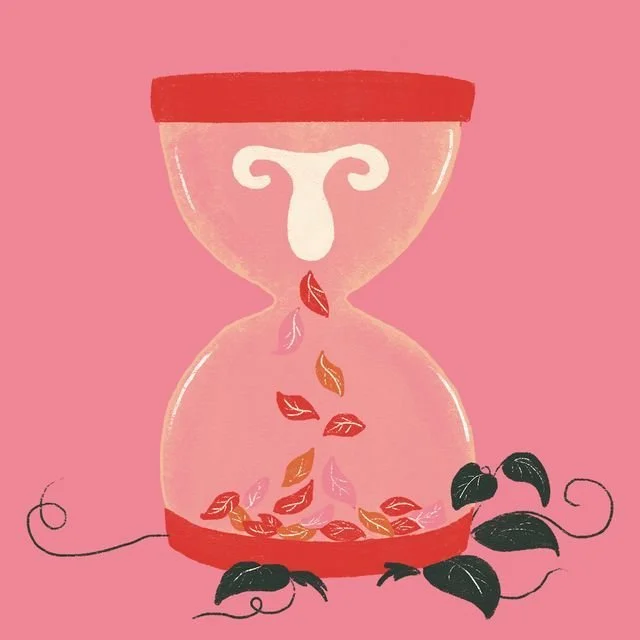What No One Tells You About Menopause — and Why We Should Talk About It
Written by: Luísa Monte
Published on: April 30, 2025
Unknown artist
Estimated Reading Time:4-5 minutes
Talking about menopause still makes many people uncomfortable. But why is such a natural and inevitable part of the female body’s journey still surrounded by silence? The truth is that approaching this transition with clarity and knowledge can be deeply liberating.
Menopause doesn’t happen overnight. It’s a process — one that affects not only the body but also our emotions, our self-image, and our relationships. And just like every woman is unique, each experience of menopause is too. In this blog, we want to follow you through this journey — with clarity, compassion, and care. Because information is a form of self-care too.
A body in transition, through different phases
You may have heard terms like pre-menopause, perimenopause, menopause, and post-menopause. These stages help us understand that menopause isn’t a hormonal “shutdown,” as it’s often framed, but a gradual recalibration of the body across time.
✺ Pre-menopause
This is the fertile stage before any noticeable hormonal changes. But it's important to know that habits and self-care during this time can influence how menopause will be experienced later on.
✺ Perimenopause
This is when the body begins to show the first signs that change is coming. Oestrogen levels begin to fluctuate, leading to possible symptoms such as:
Irregular periods
Hot flashes
Mood swings
More frequent fatigue
This phase can begin in your early 40s (or even before), but it varies. Some women move through it with few symptoms, while others feel like they’re inside a storm.
✺ Menopause
This is marked officially when a woman goes 12 consecutive months without menstruating. It typically occurs between the ages of 48 and 52. Symptoms may peak during this time:
Hot flashes
Night sweats
Vaginal dryness
Trouble concentrating
Mood changes
Lower libido
Sleep disruptions
This is the stage when the ovaries stop releasing eggs and levels of reproductive hormones drop significantly.
But menopause is not the end — it’s the beginning of a new phase.
✺ Post-menopause
This phase begins after menopause and lasts for the rest of life. Symptoms often ease, but new areas of care become important, like bone health and cardiovascular wellbeing. This is a time for autonomy, self-respect, and the pleasure of living fully — without fear or shame.
“Menopause doesn’t happen overnight. It’s a process — one that affects not only the body but also our emotions, our self-image, and our relationships.”
A new chapter — not an ending
Menopause moves more than hormones. It touches how we feel, how we show up in the world, and how we see ourselves. In a society that still links worth to youth and productivity, many women report feeling invisible during this stage. That’s why speaking openly and naturally about menopause matters so much. It helps dismantle taboos and fosters collective care.
“Menopause is not the end of femininity or vitality — it’s an invitation to begin again, with wisdom, presence, and autonomy.”
While emotional intensity and physical changes may arise, having access to compassionate healthcare, active listening, and reliable information can make a big difference. You don’t have to go through this alone.
“Menopause moves more than hormones. It touches how we feel, how we show up in the world, and how we see ourselves. “
Image by Abhishek Koli
We need more science about women
Here’s something many don’t know:
Until the 1990s, most clinical studies on health and medication were conducted almost exclusively on men — even when researching conditions that affect women. The NIH Revitalization Act of 1993 was a turning point in the U.S., requiring the inclusion of women in health research. But progress has been slow. What deserves attention now isn’t the delay, but the opportunity to close the gap in women’s health research.
Even today, menopause receives less than 2% of global funding for medical research related to reproductive health. That’s why so many women still feel underinformed, misunderstood, or unsupported when facing this life stage. This phase reshapes, renews, and invites a different kind of presence.
Here’s a gentle list to support you or someone you love through this transition — mind, body and spirit:
✺ Track your symptoms with a journal or app — understanding patterns can empower you.
✺ Prioritise sleep hygiene, especially if hot flushes and insomnia are showing up.
✺ Stay physically active, even lightly — it boosts mood, supports bones, and helps with hormonal balance.
✺ Explore nutrition that supports hormonal health: flaxseeds, leafy greens, omega-3s, and calcium-rich foods.
✺ Talk to your GP or a specialist about safe, personalised treatment options, including HRT if relevant.
✺ Practice self-compassion — this is a new chapter, not a crisis.
✺ Find community, whether it’s a circle of friends, a support group, or a podcast that speaks your language.
✺ Stay curious — about your own body and about what this stage might awaken in you.
Whether you’re approaching menopause, in the middle of it, or supporting someone who is — we’re with you. With knowledge, science, and solidarity.
Sources:
https://newsnetwork.mayoclinic.org/pt/2023/01/19/sintomas-da-menopausa-especialista-da-mayo-clinic-fala-sobre-terapias-hormonais-e-nao-hormonais/?utm_source=chatgpt.com
https://www.nutricionistamenopausa.com.br/qual-idade-menopausa-comeca/
https://bemestarbr.com.br/glossario/menopausa-entenda-as-fases-e-sintomas/



